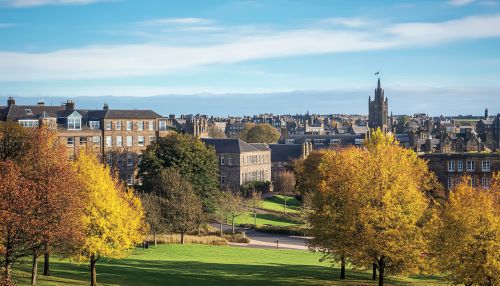University of Dundee
History
The University of Dundee, located in Dundee, Scotland, is a renowned public research university with a rich history dating back to its founding in 1881. Originally established as University College, Dundee, it was a constituent college of the University of St Andrews until it gained independent university status in 1967. The institution was founded with the support of the Baxter family, prominent local industrialists, who envisioned a college that would provide higher education opportunities to the people of Dundee and the surrounding region.
Throughout its history, the University of Dundee has been at the forefront of academic innovation and research. In the early 20th century, it became known for its contributions to the fields of medicine and life sciences, particularly through the work of Sir James Alfred Ewing and Sir Patrick Geddes. The university's medical school, established in 1897, has been instrumental in advancing medical education and research.
Campus and Architecture
The University of Dundee's main campus is situated in the heart of Dundee, offering a blend of historic and modern architecture. The campus is known for its distinctive brutalist structures, such as the Tower Building, which houses administrative offices and lecture halls. The university has invested significantly in expanding and modernizing its facilities, including the award-winning Queen Mother Building, home to the School of Computing.


The campus is also home to the Duncan of Jordanstone College of Art & Design, which has a reputation for excellence in art and design education. The college's buildings reflect a blend of traditional and contemporary styles, providing an inspiring environment for creative pursuits.
Academic Structure
The University of Dundee is organized into several schools and colleges, each offering a range of undergraduate and postgraduate programs. Key academic divisions include the School of Medicine, School of Life Sciences, School of Humanities, and School of Social Sciences. The university is renowned for its research-led teaching approach, emphasizing the integration of research and education.
The School of Medicine is particularly notable for its contributions to medical research and education. It offers a comprehensive curriculum that includes clinical placements and research opportunities, preparing students for careers in medicine and healthcare. The School of Life Sciences is a hub for cutting-edge research in areas such as genomics, biochemistry, and pharmacology.
Research and Innovation
The University of Dundee is recognized as a leading research institution, with a strong emphasis on interdisciplinary collaboration and innovation. It has been ranked among the top universities in the UK for research impact, particularly in the fields of life sciences and medicine. The university's research centers and institutes focus on addressing global challenges, such as health, sustainability, and social justice.
One of the university's flagship research initiatives is the Drug Discovery Unit, which collaborates with industry partners to develop new therapies for diseases such as cancer and neglected tropical diseases. The unit's work has led to significant breakthroughs in drug development and has attracted substantial funding from organizations such as the Bill & Melinda Gates Foundation.
Student Life and Culture
The University of Dundee offers a vibrant student life, with a diverse range of clubs, societies, and activities. The Dundee University Students' Association (DUSA) plays a central role in organizing events and supporting student initiatives. The university's location in Dundee, a city known for its cultural and creative industries, provides students with access to a rich array of cultural experiences, including museums, galleries, and theaters.
The university is committed to promoting diversity and inclusion, with initiatives aimed at supporting students from diverse backgrounds. It has a strong international community, with students from over 140 countries, contributing to a multicultural and inclusive campus environment.
Notable Alumni
The University of Dundee has produced a number of distinguished alumni who have made significant contributions to various fields. Among them is Sir Philip Cohen, a prominent biochemist known for his work on cell signaling and protein phosphorylation. Another notable alumnus is Brian Cox, the acclaimed actor and director, who has had a successful career in film, television, and theater.
The university's alumni network is active and engaged, providing support and opportunities for current students and recent graduates. Alumni events and initiatives foster connections between graduates and the university, promoting lifelong learning and professional development.
Future Developments
Looking to the future, the University of Dundee is focused on expanding its research capabilities and enhancing its educational offerings. The university has outlined a strategic plan that emphasizes sustainability, digital transformation, and global engagement. It aims to strengthen its partnerships with industry and academia, both locally and internationally, to address pressing global challenges.
The university is also committed to enhancing its campus infrastructure, with plans for new facilities and upgrades to existing buildings. These developments are designed to support the university's mission of providing a world-class education and fostering a dynamic research environment.
